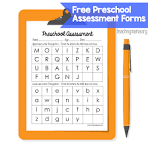
Preschool Assessment Checklist: A Guide for Parents and Educators
Assessing a child’s development is an essential part of early childhood education. A preschool assessment checklist can help parents and educators track a child’s progress and identify areas where additional support may be needed.
What is a Preschool Assessment Checklist?
A preschool assessment checklist is a tool used to evaluate a child’s skills, behaviors, and developmental milestones. It typically covers various areas of development, including cognitive, social, emotional, language, and physical development.
Why is it Important?
Assessing a child’s development allows parents and educators to gain insights into the child’s strengths and areas that may need improvement. By using a checklist, they can track progress over time and tailor educational activities to meet the child’s specific needs.
Components of a Preschool Assessment Checklist
A typical preschool assessment checklist may include items such as:
- Cognitive skills (e.g., problem-solving abilities)
- Social skills (e.g., interacting with peers)
- Emotional development (e.g., managing emotions)
- Language skills (e.g., vocabulary and communication)
- Fine and gross motor skills (e.g., coordination and balance)
Using the Checklist
To use a preschool assessment checklist effectively, parents and educators should observe the child in various settings and activities. They can note the child’s responses to different tasks or situations and mark off items on the checklist accordingly.
Conclusion
A preschool assessment checklist is a valuable tool for monitoring a child’s development and ensuring they receive the support they need to thrive. By using this checklist, parents and educators can work together to provide a well-rounded educational experience for young children.
5 Essential Tips for an Effective Preschool Assessment Checklist
- Use a variety of assessment methods to gather information about the child’s development.
- Ensure that the assessment checklist is age-appropriate and aligned with preschool standards.
- Regularly review and update the checklist to reflect the child’s progress and growth.
- Involve parents or guardians in the assessment process to gain a more comprehensive understanding of the child’s abilities.
- Use assessment results to inform lesson planning and individualize instruction for each child.
Use a variety of assessment methods to gather information about the child’s development.
When utilizing a preschool assessment checklist, it is crucial to employ a diverse range of assessment methods to gather comprehensive information about the child’s development. By incorporating various approaches such as observations, informal conversations, hands-on activities, and standardized assessments, educators and parents can gain a more holistic understanding of the child’s skills and progress. This multifaceted approach allows for a more accurate assessment of the child’s strengths and areas that may require additional support, enabling tailored interventions to enhance their overall development effectively.
Ensure that the assessment checklist is age-appropriate and aligned with preschool standards.
It is crucial to ensure that the preschool assessment checklist is age-appropriate and aligned with preschool standards. By using a checklist that is tailored to the child’s age and development stage, parents and educators can accurately assess the child’s progress and identify areas for growth. Aligning the checklist with preschool standards helps ensure that the assessment covers all essential areas of development, providing a comprehensive overview of the child’s skills and abilities. This approach allows for targeted support and intervention when needed, ultimately benefiting the child’s overall learning experience in preschool.
Regularly review and update the checklist to reflect the child’s progress and growth.
It is crucial to regularly review and update the preschool assessment checklist to accurately reflect the child’s progress and growth. By consistently revisiting the checklist, parents and educators can track changes in the child’s development over time and adjust their support strategies accordingly. This ongoing assessment ensures that the child’s evolving needs are met effectively, leading to a more tailored and beneficial learning experience.
Involve parents or guardians in the assessment process to gain a more comprehensive understanding of the child’s abilities.
Involving parents or guardians in the preschool assessment process is crucial for gaining a more comprehensive understanding of the child’s abilities. Parents play a vital role in a child’s development and can provide valuable insights into the child’s behavior, skills, and interests outside of the school setting. By collaborating with parents or guardians, educators can gather a more holistic view of the child’s strengths and areas for improvement, allowing for a more tailored and effective approach to supporting the child’s growth and development.
Use assessment results to inform lesson planning and individualize instruction for each child.
Using assessment results to inform lesson planning and individualizing instruction for each child is a crucial step in providing effective early childhood education. By analyzing the data gathered from the preschool assessment checklist, educators can tailor their teaching strategies to meet the specific needs and learning styles of each child. This personalized approach ensures that all children receive the support and guidance they require to reach their full potential. By incorporating assessment results into lesson planning, educators can create a more engaging and enriching learning environment that fosters growth and development in every child.
